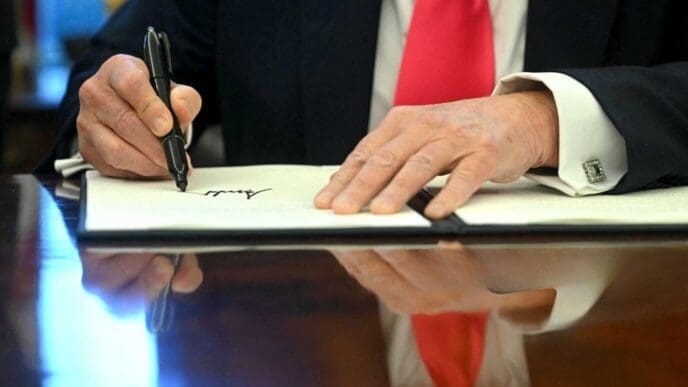Executive Summary
The Story So Far
Why This Matters
Who Thinks What?
Donald Trump announced Tuesday that he would relocate the United States Space Command (SPACECOM) headquarters to Huntsville, Alabama, reversing a previous decision by the Biden administration to maintain its presence in Colorado Springs, Colorado. Trump cited his initial selection of Huntsville for the command and criticized the Biden administration for obstructing those plans, further alleging that Colorado’s mail-in voting system led to “crooked elections.”
A Contested Headquarters Location
SPACECOM, a joint command separate from the US Space Force, is tasked with overseeing national security operations in space. Its responsibilities include managing satellites and networks for missile warnings, communications, and in-space surveillance, alongside tracking orbital debris and potential threats to US and allied spacecraft.
The permanent location for SPACECOM’s headquarters has been a subject of ongoing debate and accusations of political manipulation since President Trump reestablished the center in its modern form in 2018. At that time, SPACECOM was initially set up as a temporary location in Colorado Springs while other cities were evaluated for a long-term home.
Shifting Recommendations and Decisions
In 2021, the US Air Force recommended moving the command to Huntsville, Alabama, citing it as the most cost-effective option. However, a 2022 report from the Government Accountability Office (GAO) found “significant shortfalls in its transparency and credibility” regarding the Air Force’s decision-making process.
The following year, President Joe Biden sought to make Colorado Springs the permanent location, following a recommendation from Gen. James Dickinson, then-head of Space Command. General Dickinson had cautioned that a move to Alabama could compromise military readiness due to the time required to make a new headquarters fully operational.
Colorado officials welcomed Biden’s decision, with the local chamber of commerce highlighting the preservation of nearly 1,400 Colorado jobs and an annual economic impact of $1 billion. Conversely, Alabama officials expressed strong disagreement and anger, having long lobbied for the move to Huntsville. Alabama Senators Tommy Tuberville and Katie Britt, who stood beside Trump during his recent announcement, had previously vowed to continue fighting for the relocation.
Inspector General’s Findings and Air Force Preference
Last year, House Armed Services Committee leadership requested an evaluation of Biden’s decision by the Department of Defense’s Inspector General. A report released in April concluded that establishing a temporary SPACECOM headquarters in Alabama, comparable to what was available in Colorado, would take three to four years.
Despite the potential delays, Air Force officials continued to express their preference for the Huntsville relocation. The report also noted that investigators were unable to determine why the Biden administration did not accept the Air Force’s initial recommendation to move SPACECOM to Huntsville.
The Air Force had stated that Huntsville ranked highest in its evaluation, which considered factors such as mission synergy, infrastructure, cost, community support, and quality of life. It acknowledged inherent risks to readiness from moving the headquarters but balanced that against a projected $426 million cost advantage of relocating to Alabama. Separately, a May GAO report indicated that Space Command officials had reported “ongoing personnel, facilities, and communications challenges” in Colorado.
Strategic Importance and Regional Hubs
SPACECOM is the US military’s 11th combatant command, standing alongside critical commands like US Central Command and US Special Operations Command. President Trump’s 2018 decision to reestablish SPACECOM came amid renewed emphasis from national security experts on the importance of space operations.
Congressional figures often cite competition with China and the imperative to establish US supremacy in space technology as urgent considerations. A 2023 memorandum from the SPACECOM commander highlighted China’s space program as a personal focus for President Xi and a symbol of their great power status, emphasizing the need for US effectiveness against this threat.
Both Colorado Springs and Huntsville boast long histories as significant centers for aerospace and defense activities, hosting facilities for major companies such as Lockheed Martin, Northrop Grumman, Boeing, and L3Harris. Huntsville, known as “Rocket City,” is home to Redstone Arsenal and NASA’s Marshall Space Flight Center, while Colorado Springs has hosted Space Command headquarters at Peterson Air Force Base from 1985 to 2002, before its reestablishment.
President Trump’s latest announcement reignites the debate over SPACECOM’s permanent home, underscoring the political and strategic complexities involved in determining the optimal location for a command critical to national security and global power competition.














